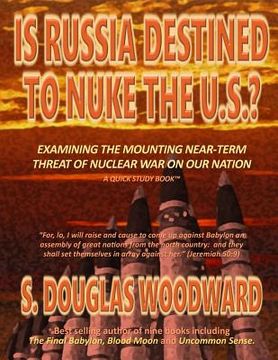Is Russia Destined to Nuke the U.S.?: Examining the Growing Near-term Threat of Nuclear War on Our Nation (in English)
Synopsis "Is Russia Destined to Nuke the U.S.?: Examining the Growing Near-term Threat of Nuclear War on Our Nation (in English)"
The United States and the Russian Federation are engaged in a war of words-a war that has elevated tensions between these political, military, and economic rivals to its highest level since the end of the Cold War in 1989. Spurring the bellicose discourse: (1) Russian incursion in the Ukraine and Crimea to reestablish Russian influence in those lands, (2) concerns expressed by former Warsaw Pact nations (e.g., Poland, Romania, and Estonia) regarding Russian intentions, and (3) the response of NATO and the U.S. to calm those concerns. According to Russian leaders, this territory historically belongs to Russia. Regardless of this diplomatic debate, however, facts on the ground matter much more: the population in the eastern one-third of the country and all of Crimea (geographically sitting atop the Black Sea) are predominately Russian-speaking. Ukrainians, whose ancestry has been tied to the land for centuries, loathe the Russians. As a result, the conflict has grown into a virtual civil war. During the past two decades, the United States has supported Ukrainian desires to participate in the European Union and join NATO, while Russia has argued these actions foment rebellion among what they regard as a minority of Ukrainians. Underneath these somewhat superficial arguments, Russia worries about its largest submarine base in Crimea at Sevastopol, which they consider utterly vital to their security. Additionally, Russia aggressively continues to seek a geographical buffer between itself and Europe having been devastated by two great wars during the past 100 years. Europe protests the incursion but seems unwilling (and unable) to use military force to push Russia back from its designs on Ukraine and Crimea. Only the U.S. displays the willingness to hold the line and demand Russia back down. Now the U.S. increases its rapid deployment force and naval assets to the region to put Russia in check. But what motivates the U.S.?Russian nerves remain on edge due to a slumping Russian economy, its aging weapon systems, and frequent bouts of political unrest domestically but especially in Russia's eastern and southern republics. Russia's federal government depends on a steady, high price of oil and natural gas, with as much as 52% of its revenue coming from these sources. Then there is the state of the Russian people. They suffer under economic sanctions imposed by Europe and the United States. Backed into a corner, is it surprising Russia rattles its sabre? However, Russia's only sabre-its one area of military superiority: Russian tactical nuclear weapons outnumbering NATOs tactical nukes 10 to 1 in the region. As Russia weakens in critical areas, several principal factors are converging which suggest Russia must act NOW to diminish U.S. economic dominance, military superiority, and political influence-for Russia seeks to curb U.S. "meddling" in regional affairs that they surmise threatens its national security. Additionally, Russia advances the strategic view that it is Washington and not Moscow that promotes domestic disputes throughout Eurasia, what Russians term "color revolutions." To Russian leaders, these Color Revolutions comprise CIA covert operations and insurrections intended to destabilize nations Russia regards vital to its interests, all the way from Syria to Afghanistan. In short, the Ukraine controversy may be a symbol of a much broader and deeper conflict. It constitutes a geopolitical sparring match-a contest in which both sides test the other's resolve to dominate global politics in the 21st century. In addition to examining why this verbal exchange foreshadows nuclear war sometime in the next few years, this study will discuss whether this potential war could be the fulfillment of biblical predictions regarding the dismal fate of what the Bible calls, the "daughter of Babylon." Finally, we consider the possible timing of this horrific confrontation in light of other end time events.

